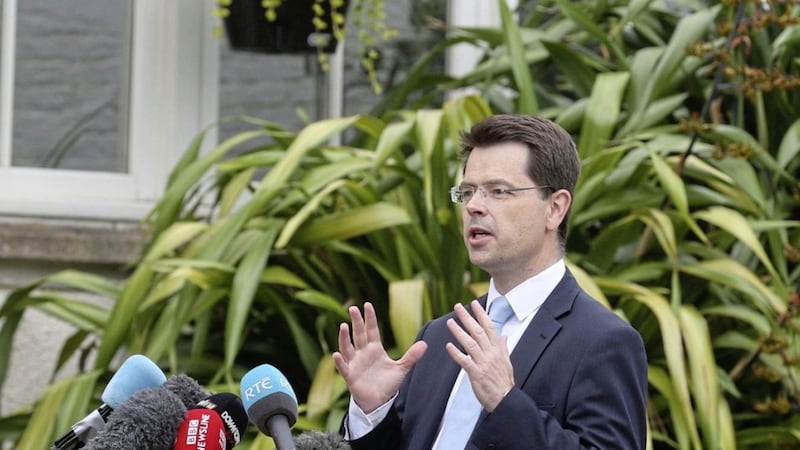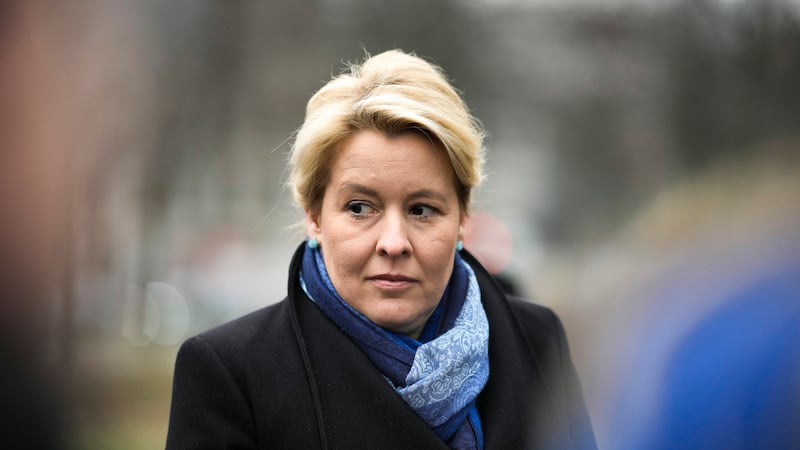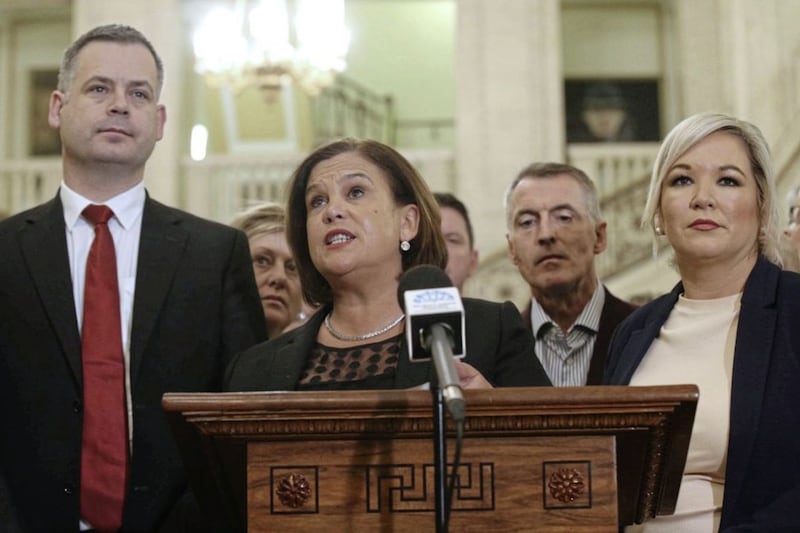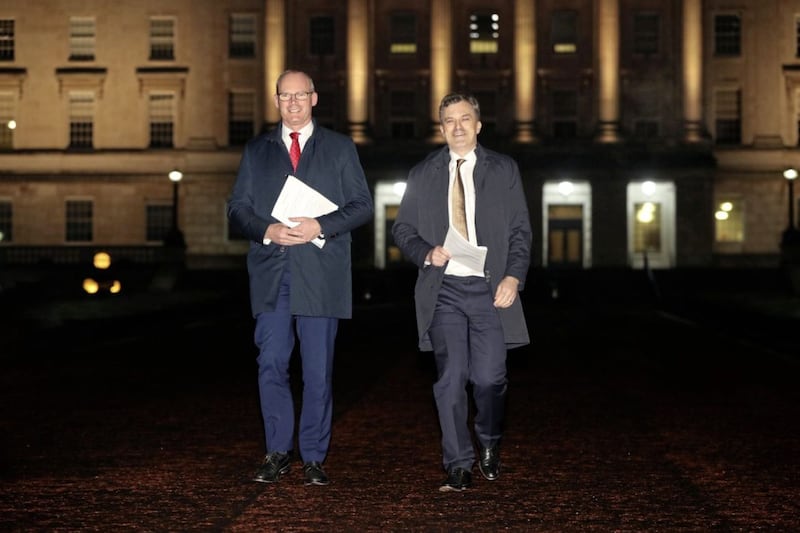EFFORTS to secure a deal to restore devolution hung in the balance last night after republicans accused the DUP of intransigence.
With the countdown on until tomorrow's deadline for a deal to be secured, Sinn Féin chairman Declan Kearney emerged from yesterday afternoon's roundtable talks at Stormont claiming Arlene Foster's party had failed to move on a range of key issues.
But despite the air of pessimism, the talking continued in the hope of finding agreement ahead of tomorrow's scheduled sitting of the assembly, where if a last minute deal is struck, the parties will nominate a first and deputy first minister.
Secretary of State James Brokenshire, who in April set tomorrow's 4pm deadline for agreement, warned that time was running out.
The Tory MP said engagement between the parties had been intensive, with a focus on differences over equality and language issues.
"Time is marching on," he said.
"It is about now reaching that conclusion, meeting that statutory deadline of Thursday afternoon and finding a way through in the best interests of Northern Ireland."
Although Mr Brokenshire stressed that tomorrow's cut-off point was set in law, he did not definitively rule out another extension.
"It was an act of parliament that set that and therefore it is that very clear deadline that we are seeking to ensure is met," he said.
Mr Brokenshire told MPs today: "Our focus is on seeing that an Executive is restored and I have been clear on not wanting to pre-empt what may happen should that not be the case.
"Obviously there would be profound and serious implications in that context."
He said he would work with all parties to see that the issues were considered carefully.
In a statement last night a spokesman for Theresa May said the prime minister had spoken to her Irish counterpart Leo Varadkar to discuss details of the arrangement with the DUP and to stress the UK government's commitment to the Good Friday Agreement and "in governing in the interests of all parts of the community in Northern Ireland".
"They confirmed their joint commitment to restore a Northern Ireland Executive as soon as possible and agreed to engage closely, and work with the parties in Northern Ireland, to bring back political stability and a strong voice at Stormont," the statment read.
HoweverAlliance leader Naomi Long described the outlook for a deal as "incredibly bleak".
She said the issues on the table were "entirely surmountable" but it needed the parties to "do business together in a rational and reasonable way".
Her assessment was confirmed by Sinn Féin's Declan Kearney, who said the DUP had failed to concede ground on any of the "substantive issues which sit at the heart of this crisis".
"They haven't moved on any of the fundamental rights and equality issues that require to be embraced," he said.
Asked if Sinn Féin was prepared to drop its opposition to Mrs Foster returning as first minister while the RHI public inquiry is ongoing, Mr Kearney again stressed the urgent need was to address the "rights and equality" issues.
"In those circumstances if in fact we can find resolution and progress on all of the fundamental issues then we can address the issue of the future role of the DUP leader in a possible future executive but at this point that question is academic," he said.
Ulster Unionist leader Robin Swann blamed republicans for "causing the stumbling blocks" in the negotiations.
"Unless that intensification process delivers today and, I suppose, maybe even later into the night, I think we're not looking at the return of the devolved institutions in this period and I think that's a very dangerous place to be in," he said.
The DUP's Edwin Poots said Sinn Féin needed to show respect for all traditions.
He suggested that agreement couldn't be reached by the deadline then a "parallel process" could see the assembly restored while negotiations continued.
Here are wrangles at the heart of the Stormont crisis:
- Irish Language Act
Sinn Fein want a stand-alone piece of legislation that would enshrine protections for Irish language speakers.
The DUP appears willing to legislate, but only if the Ulster Scots language is also included.
The issue has become a touchstone for a wider debate on respect for Irish and British cultures in post-conflict Northern Ireland.
Sinn Fein accuses the DUP of treating the nationalist tradition with contempt, on the other hand, the main unionist party claims republicans have politicised the Irish language for their own ends.
- Same sex marriage
Northern Ireland is the only part of the UK and Ireland where same-sex marriage remains outlawed.
The DUP has used the voting mechanism to prevent a law change, despite a majority of MLAs supporting the move at the last vote at Stormont.
Following March's snap Assembly election, the DUP no longer has the electoral strength to deploy a petition of concern in its own right, though it could still potentially combine with other socially conservative MLAs to do so, if and when powersharing is restored.
While Sinn Fein wants the DUP to stop blocking a law change, the DUP insists it is protecting the traditional definition of marriage.
- Bill of Rights
Sinn Fein believe a Bill of Rights is an unfulfilled element of the 1998 Good Friday Agreement.
The DUP is not ideologically opposed to enshrining human rights protections but only if, in its view, they represent the interests of all section of society.
The have dismissed previous suggested formats as "left-wing wish lists".
The party has also previously raised concern that a separate Northern Ireland Bill might create a "disparity" with human rights legislation elsewhere in the UK.
Sinn Fein also wants the re-establishment of a forum to allow civic society to contribute to the political process.
- Renewable heat incentive
While a public inquiry has been called into the financial furore around Stormont's ill-fated green energy scheme, an initiative that landed the executive with a potential £490 million overspend bill, the issue that brought down the administration is still causing political friction.
Sinn Fein had insisted it would not re-enter a coalition with DUP leader Arlene Foster as first minister until her role in the RHI (she oversaw its inception when economy minister) is investigated.
The DUP has branded that stance as an "unacceptable precondition" and said if republicans want to veto its choice of first minister it would return serve, and block Sinn Fein's choice of deputy first minister.
On Tuesday, Sinn Fein hinted it could give ground on this issue if it achieves movement on other outstanding issues.
- Legacy
Given the parties' different perspectives on the past, it is notable that quite a lot has already been agreed on how to deal with the toxic legacy of the Troubles.
The problem is while a raft of initiatives, including a new investigatory body, a truth recovery mechanism and an oral achieve, have been agreed, they are stuck in the starting blocks due to a small number of discreet impasses.
This dispute also involves the UK government.
One of the main ones is the thorny issue of national security and republican fears the government would cite that as a reason to withhold documents to bereaved families.
Claims made by unionists and Tory backbenchers that recent prosecutions of former British soldiers is tantamount to a "witch-hunt" have further complicated the picture, with the government facing calls to introduce a statute of limitations on prosecutions of former security force members.
A suggested public consultation exercise on the proposed legacy mechanisms would not fully resolve the issues, but it could move it on enough to give space to enable an executive to be formed.
- Brexit
With the parties taking opposing positions in the EU referendum (DUP - Leave/Sinn Fein - Remain) it came as a surprise that they were able to adopt a joint approach to the issue when Arlene Foster and Martin McGuinness penned a letter to Theresa May last year.
The letter highlighted the need to protect cross-border trade links and stressed the need to retain access to sources of skilled and unskilled labour in the EU.
The vulnerability of an agri-food sector reliant on EU subsidies was also raised, as were concerns that a proportion of billions of euro of EU funds for projects in Northern Ireland may not be drawn down.
A lot of water has flowed under the bridge since then.
Sinn Fein's demand for special designated EU status for Northern Ireland post-Brexit has raised unionist concerns that republicans' real motive is to drive a wedge between the region and the rest of the UK.
The fact Brexit has now been caught up in a reignited debate about a united Ireland has also polarised the issue.
While a joint approach is now highly unlikely, it is doubtful Brexit alone would stand in the way of a new executive being formed.








